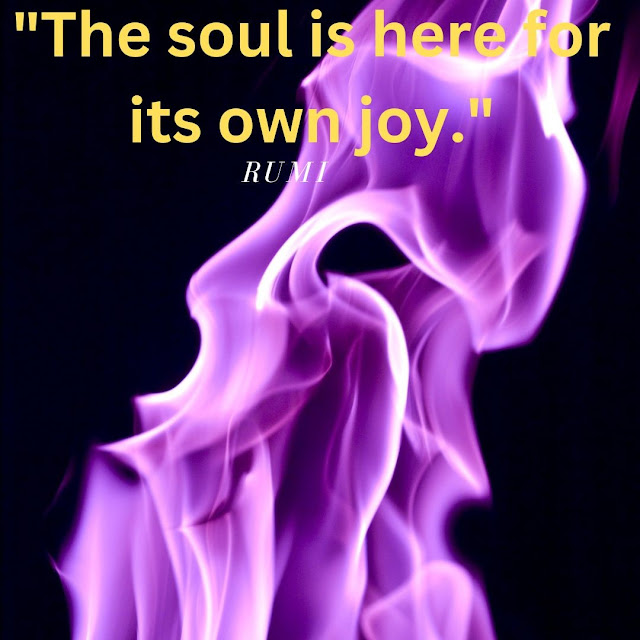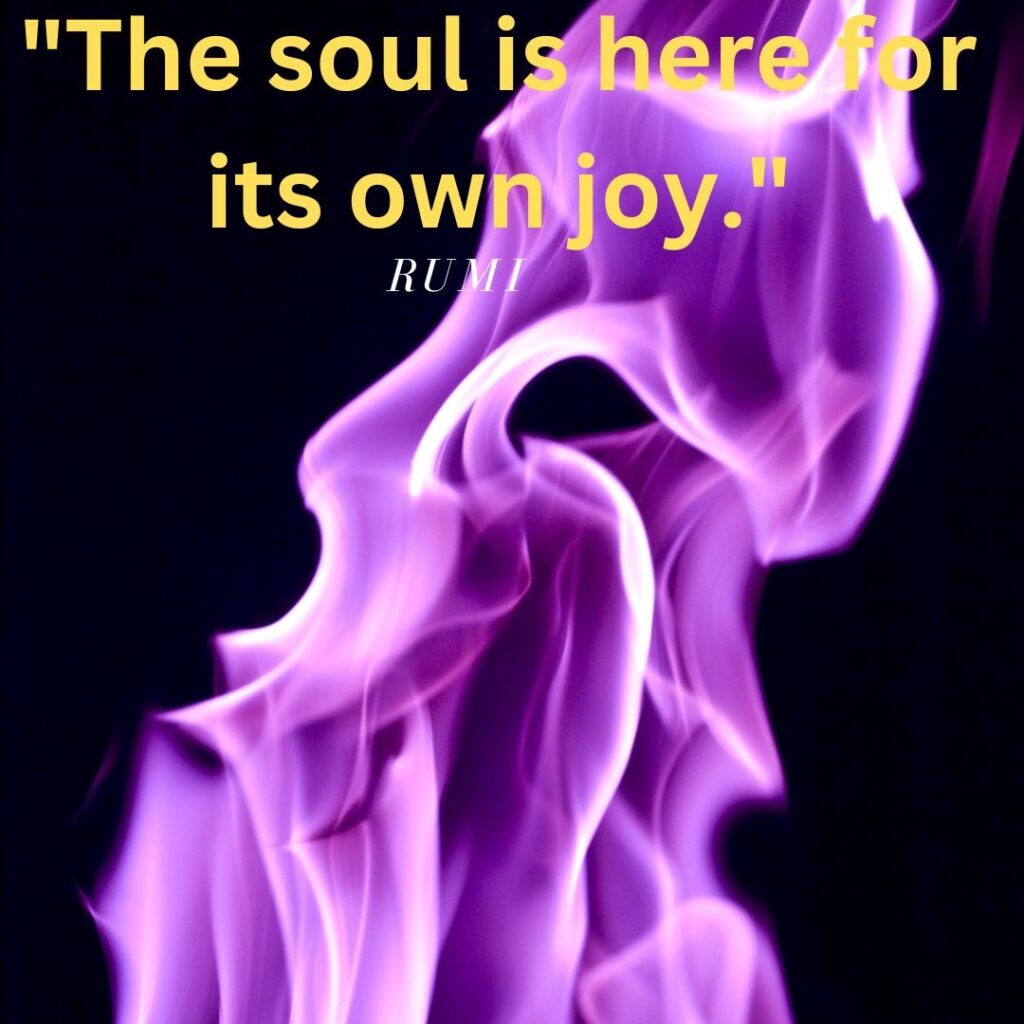Rumi’s “The Soul is Here for Its Own Joy“

Introduction
In a world filled with complex philosophies and spiritual teachings, few quotes resonate as profoundly as Rumi’s profound words: “The Soul is Here for Its Own Joy.” This timeless utterance encapsulates the essence of human existence, inviting us to ponder the purpose of our lives and the pursuit of happiness. Through this article, we will embark on a journey to explore the multi-faceted meanings concealed within these seven simple words. From understanding the core message to delving into its applications in our lives, we will dissect and illuminate Rumi’s wisdom.
- The Soul’s Quest for Joy
Rumi’s quote, at its heart, encapsulates the idea that our souls inhabit this earthly realm with the primary purpose of experiencing joy. This perspective challenges conventional notions of life’s purpose, which often revolve around achievement, success, and external validations. By asserting that the soul’s ultimate goal is self-generated joy, Rumi encourages us to seek fulfilment from within rather than relying solely on external circumstances.
- Embracing Individual Journey
Rumi’s wisdom underscores the uniqueness of each individual’s journey. The quote implies that the soul’s purpose isn’t uniform or prescribed; instead, it’s a personal voyage towards self-discovery and contentment. This perspective liberates us from societal pressures and allows us to authentically explore our passions, dreams, and desires, leading to a more meaningful existence.
- Beyond Material Pursuits
In a world fixated on material pursuits, Rumi’s words serve as a poignant reminder that the accumulation of possessions and wealth isn’t the ultimate goal. The pursuit of joy is an intangible yet profound aspiration that transcends materialism. This insight encourages us to reevaluate our priorities and invest in experiences, relationships, and moments that nurture our inner joy.
- Navigating Challenges and Suffering
Rumi’s quote doesn’t negate the presence of challenges and suffering in life; instead, it offers a perspective shift on how we approach them. The soul’s quest for joy doesn’t deny adversity but instead suggests that even in the face of difficulties, we can find strength and resilience through cultivating inner joy. This outlook empowers us to navigate life’s trials with grace and courage.
- Connection to Spiritual Growth
Delving deeper, Rumi’s quote aligns with spiritual teachings that emphasize inner growth and enlightenment. Many belief systems posit that the soul’s journey involves evolving towards higher states of consciousness. In this context, joy becomes a marker of spiritual progress, signifying alignment with one’s true self and a deeper connection to the universe.
- Embodying Present-Moment Awareness
Rumi’s words also prompt us to practice mindfulness and embrace the present moment. When the soul seeks joy, it encourages us to fully engage with the here and now, extracting happiness from the simple pleasures that surround us. This mindfulness fosters gratitude and a profound appreciation for life’s subtleties.
- FAQs about Rumi’s Quote: “The Soul is Here for Its Own Joy”
Q1. What Does Rumi’s Quote Mean?
Rumi’s quote conveys that the primary purpose of the soul’s presence in this world is to experience inner joy. It encourages us to find happiness within ourselves rather than relying solely on external factors.
Q 2. How Can I Apply This Quote in My Life?
You can apply Rumi’s quote by prioritizing activities and experiences that bring you genuine joy and fulfilment. This might involve pursuing passions, nurturing relationships, practising gratitude, and embracing mindfulness.
Q 3. Does Rumi’s Quote Deny the Challenges of Life?
No, Rumi’s quote acknowledges that life comes with challenges. However, it offers a perspective shift, suggesting that even in difficult times, nurturing inner joy can provide resilience and strength to overcome obstacles.
Q 4. Is Joy the Only Emotion the Soul Should Experience?
While joy is highlighted in the quote, it doesn’t exclude other emotions. Instead, the pursuit of joy can encompass a range of emotions and experiences that contribute to a richer, more fulfilling life.
Q 5. How Can I Cultivate Inner Joy?
Cultivating inner joy involves self-discovery, self-care, and engaging in activities that resonate with your true self. It also involves letting go of societal expectations and embracing your individual journey.
Q 6. What’s the Connection Between Joy and Spiritual Growth?
Many spiritual traditions emphasize the connection between inner joy and spiritual growth. Joy can be seen as an indicator of alignment with one’s higher self and a deeper understanding of the universe.

7. Ways to live a life of joy according to Rumi:
- Love unconditionally. Rumi believed that love is the highest form of joy. When we love others without conditions, we open ourselves up to a world of beauty and possibility.
- Be creative. Rumi was a poet and musician, and he believed that creativity is a way to express our souls. When we create something beautiful, we share a piece of ourselves with the world.
- Connect with nature. Rumi often wrote about the beauty of nature, and he believed that it can help us to connect with our true selves. Spending time in nature can help us to relax, de-stress, and find peace.
- Help others. Rumi believed that helping others is a way to connect with our divine nature. When we give of ourselves, we feel joy and satisfaction.
- Live in the present moment. Rumi often said that the past is gone and the future is not yet here, so we should focus on the present moment. When we live in the present, we can appreciate the good things that are happening right now.
These are just a few ways to live a life of joy according to Rumi. By following these principles, we can find true happiness and fulfilment in our lives.
Conclusion: Embrace the Joyful Journey of the Soul
Rumi’s quote, “The Soul is Here for Its Own Joy,” invites us to embark on a profound journey of self-discovery, mindfulness, and authenticity. It challenges us to redefine our priorities, embrace challenges with resilience, and cultivate joy from within. In a world often characterized by chaos and external pressures, Rumi’s timeless wisdom serves as a guiding light, reminding us that the pursuit of joy is a noble and transformative path.


